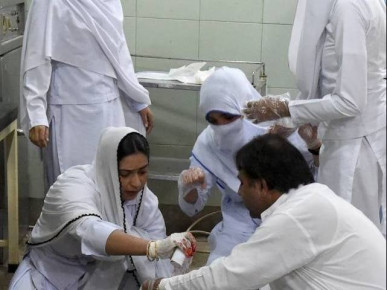
Healthcare Education Trends and Opportunities in Pakistan
Healthcare education in Pakistan is experiencing significant transformation due to rapid technological advancements, government initiatives, and increasing demand for skilled professionals in medicine, allied health, and public health sectors. The country faces a growing population and evolving healthcare needs, making education and training in healthcare more critical than ever. Understanding current trends and emerging opportunities allows students, educators, and policymakers to align strategies that improve healthcare services and enhance career prospects.
One of the most notable trends in healthcare education in Pakistan is the expansion of allied health programs. While traditional medical education focuses primarily on doctors and nurses, there is now increasing recognition of the importance of specialized programs such as BS Anesthesia, Medical Laboratory Technology (MLT), Operation Theater Technology (OTT), radiology, physiotherapy, and nutrition. These programs equip students with practical and theoretical knowledge to support healthcare delivery in hospitals, clinics, and research centers. The growth of these programs has created new career paths and diversified the workforce, ensuring that healthcare services are efficient and comprehensive.
Digital learning and e-education have also emerged as key trends. Online courses, virtual simulations, and tele-education platforms allow students from remote areas to access high-quality healthcare education. Many universities and private institutions in Pakistan have adopted blended learning models, combining classroom instruction with online modules. These innovations not only increase access to education but also provide students with interactive, self-paced learning opportunities. Virtual labs and simulation software enable students to practice clinical procedures without the risks associated with live patients, ensuring both safety and skill development.
Government policies and accreditation standards are shaping healthcare education trends in Pakistan. The Higher Education Commission (HEC) and the Pakistan Medical and Dental Council (PMDC) provide regulatory frameworks to ensure quality education. Universities offering healthcare programs must adhere to strict standards regarding curriculum, faculty qualifications, laboratory facilities, and clinical training. Institutions with recognized accreditation attract better faculty, more students, and international partnerships, thereby enhancing their reputation. Accreditation also ensures that graduates are eligible for employment and higher studies both within Pakistan and abroad.
Another significant trend is the integration of research and innovation into healthcare education. Universities and teaching hospitals are encouraging students to participate in research projects, clinical trials, and public health studies. This exposure fosters critical thinking, problem-solving, and evidence-based practice, which are essential for modern healthcare professionals. Research opportunities in Pakistan are increasingly aligned with global health priorities, including infectious diseases, maternal and child health, and chronic disease management, providing students with practical skills and professional visibility.
The role of technology in healthcare education cannot be overstated. Advanced medical equipment, electronic health records, telemedicine, and AI-powered diagnostic tools require students to be familiar with modern systems. Institutions in Pakistan are updating their curricula to include training on these technologies, ensuring that graduates are prepared for the contemporary healthcare environment. Simulation-based training, for instance, allows students to practice emergency responses, surgical techniques, and patient management in a controlled environment, bridging the gap between theory and practice.
Workforce demand is another factor driving opportunities in healthcare education. Pakistan’s population is growing rapidly, and with it, the need for healthcare services. Hospitals, clinics, laboratories, and public health organizations require skilled professionals to meet the increasing demand. Graduates in nursing, anesthesia, MLT, OTT, radiology, and pharmacy find ample employment opportunities in both public and private sectors. The shortage of qualified staff in rural and semi-urban areas further increases demand, presenting opportunities for graduates to work in underserved communities while contributing to national health development.
Private sector growth is shaping healthcare education trends in Pakistan. Many private hospitals and educational institutes are establishing specialized programs and training centers to produce competent healthcare professionals. These institutions often provide modern facilities, experienced faculty, and industry exposure, which attract students and enhance career prospects. Collaborations between private institutions and hospitals allow students to gain internships, practical training, and exposure to real-world clinical scenarios, ensuring they are job-ready upon graduation.
International partnerships and exchange programs are increasingly common in Pakistan’s healthcare education landscape. Collaborations with foreign universities, hospitals, and research organizations expose students and faculty to global best practices, advanced technologies, and innovative teaching methods. Such programs enhance professional skills, create networking opportunities, and allow institutions to benchmark their standards against international benchmarks. Graduates with international exposure often have better employment prospects and higher credibility in both local and global job markets.
Community health and public health education are gaining prominence in Pakistan. Training programs now focus not only on hospital-based care but also on preventive health, health promotion, and community outreach. Students learn about vaccination campaigns, maternal and child health programs, nutrition, sanitation, and health awareness initiatives. This shift reflects global healthcare trends emphasizing preventive care, population health management, and community engagement, providing graduates with broader career opportunities beyond traditional clinical roles.
Continuing professional development (CPD) and lifelong learning have become integral to healthcare education in Pakistan. Professionals are encouraged to update their knowledge through workshops, seminars, certifications, and short courses. Institutions offering CPD programs enhance their reputation and help maintain a competent workforce. Lifelong learning ensures that healthcare professionals remain current with evolving medical guidelines, technologies, and treatment protocols, ultimately improving patient care and health outcomes.
Entrepreneurial opportunities in healthcare education are also expanding. Graduates and professionals can establish specialized training centers, skill development institutes, and consultancy services. For instance, anesthesia training centers, medical lab training programs, and simulation-based clinics cater to the growing demand for trained personnel. Entrepreneurs can leverage emerging trends, technology, and partnerships to provide quality training and bridge gaps in the healthcare education system.
Challenges remain in Pakistan’s healthcare education sector. Limited funding, lack of modern infrastructure, and uneven distribution of skilled faculty are significant barriers. Rural and underdeveloped areas often lack access to quality healthcare education. Addressing these challenges requires public-private partnerships, government investment, and strategic planning. Digital education, mobile training units, and faculty development programs are some of the solutions helping overcome these limitations, ensuring equitable access to quality education.
The future of healthcare education in Pakistan is promising, with multiple avenues for career growth and societal impact. Increasing investment in hospitals, research institutions, and allied health programs ensures a steady demand for skilled professionals. Technological integration, global collaborations, and research focus provide students with modern tools and knowledge. Graduates equipped with these competencies can contribute to improving healthcare standards, patient outcomes, and national health indicators.
Healthcare education in Pakistan is evolving rapidly, shaped by technological advancements, policy reforms, private sector growth, and international collaborations. Allied health programs, digital learning, research integration, community health focus, and professional development create a robust platform for students and professionals. Opportunities abound in hospitals, clinics, research institutions, public health organizations, and educational institutes. By embracing modern trends, acquiring practical skills, and participating in continuous learning, graduates can secure meaningful careers while contributing significantly to Pakistan’s healthcare development. The sector promises not only professional growth but also the chance to make a lasting impact on public health, patient safety, and the nation’s overall well-being.







